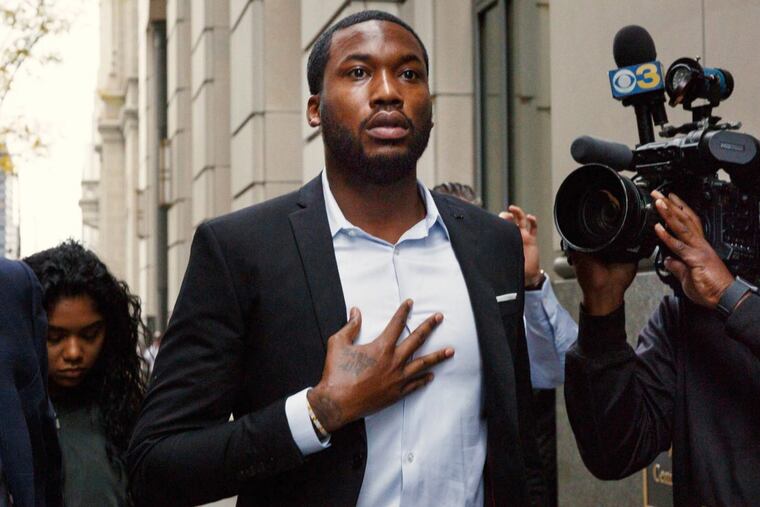Meek Mill's battle with judge enters another round
The public battle between imprisoned Philadelphia-born rapper Meek Mill and Common Pleas Court Judge Genece Brinkley went another ugly round Monday, as the judge's order denying bail and calling Mill a dangerous flight risk became public, and the rapper's legal team filed a motion claiming the FBI was investigating the judge's handling of the case.

The public battle between imprisoned Philadelphia-born rapper Meek Mill and Common Pleas Court Judge Genece Brinkley went another ugly round Monday, as the judge's order denying bail and calling Mill a "dangerous" flight risk became public, and the rapper's legal team filed a motion claiming the FBI had investigated the judge's handling of the case.
The dueling court filings came nearly a month after Brinkley sentenced the rapper Nov. 6 to two to four years in state prison for repeated violations of his probation terms stemming from a 2008 drug dealing and gun case.
Brinkley's decision was dated Friday and became public Monday. Last week, the Superior Court denied Mill's emergency motion for bail but directed Brinkley to rule on his Nov. 16 bail petition and to explain her reasons "without further delay."
In her seven-page opinion, Brinkley ruled that Mill was a danger to the community and to himself because of his drug use and reckless and violent behavior since his 2008 arrest. She said he was a flight risk due to the prison sentence she imposed and because he had given police and parole officials false addresses on a handful of occasions between 2012 and 2017.
Brinkley noted that under state law, "when a sentence of more than two years is imposed there is no constitutional right to bail pending resolution of post-sentence motions or direct appeal. Bail may be set solely at the discretion of the trial court."
Among the reasons Brinkley cited for sending Mill, 30, to prison was his August 2017 arrest in New York for recklessly driving an all-terrain vehicle in traffic, and his March 2017 arrest at the St. Louis airport stemming from a fight.
"From his original arrest, conviction, and sentence on drug and gun charges in 2009 to his August 2017 arrest for endangering the citizens of New York City, defendant has demonstrated that he continues to pose a great risk to the safety of others in Philadelphia and throughout the country," Brinkley wrote.
Brinkley also questioned the rapper's contentions that he should be freed to maintain an active role in the lives of his son and mother.
"Defendant claims to be involved in his son's life; however, significantly, his son does not reside in Philadelphia County," the judge wrote. "One look at any travel schedule previously submitted to the court would belie that claim as defendant was often not even in the Philadelphia area because this court allowed defendant to travel outside Philadelphia while on probation. Likewise, defendant's ties to his mother, who resides in New Jersey, are questionable for the same reason."
"We are very disappointed with Judge Brinkley's decision to deny Mr. Williams bail, which continues her long pattern of unfair treatment of him," said Joe Tacopina, one of Mill's attorneys. "As stated on multiple occasions, he has never missed a previous court date in this case and poses absolutely no threat to the community, which makes him an ideal candidate for bail – a conclusion [prosecutors] did not oppose."
He said Mill's legal team would immediately appeal the decision to Superior Court.
On Monday, Mill's lawyers filed a new motion asking Brinkley to recuse herself from the case, claiming that she was the subject of a 2016 FBI investigation related to her conduct presiding over the case of the rapper, whose legal name is Robert Williams.
"The existence of a federal investigation involving Judge Brinkley's conduct regarding Mr. Williams, combined with Judge Brinkley's awareness of that investigation, raises further doubt as to her ability to preside impartially, and thus is an additional factor supporting recusal," the defense team wrote.
They have publicly accused Brinkley of asking Mill to record a version of a Boyz II Men song and to change management companies. Mill attorney Brian McMonagle declined to answer questions Monday about last year's FBI investigation or how Mill's defense team became aware of it.
Federal law enforcement sources have confirmed that there is no active probe into Brinkley's handling of Mill's case. The sources spoke on the condition of anonymity because they were not authorized to discuss the matter publicly.
An FBI spokeswoman in Philadelphia said that, per Justice Department policies, her office could not confirm or deny the existence of any investigation that did not result in criminal charges.
Since Mill was sentenced to prison, his management company, Roc Nation, has been marshaling his fans and supporters on his behalf. There have been protests outside the city's Criminal Justice Center, buses and billboards calling for the hip-hop star's release, and internet petitions with hundreds of thousands of signatures.
Some criminal justice reformers have cited Mill as an example of the unfair and disparate treatment meted out to young black men caught up in the court system.
Last week, the Rev. Al Sharpton visited Mill at the state prison in Chester and promised to use his reputation as a civil rights activist and television personality to help Mill and other prisoners.
Staff writer Jeremy Roebuck contributed to this report.